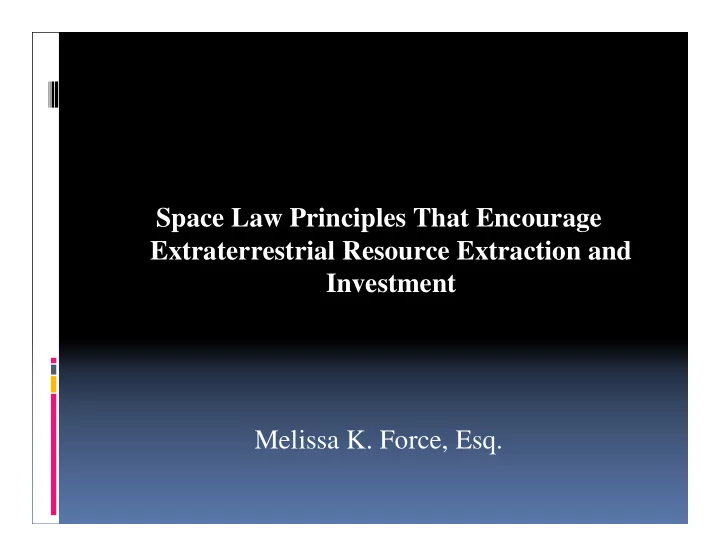

Space Law Principles That Encourage Extraterrestrial Resource Extraction and Investment Melissa K. Force, Esq.
Overview Distinguish Three Kinds of Property Rights � 1. Territory � 2. Natural Resources � 3. Objects The Current Legal Regime � 1. Don’t Need to Own Territory � 2. Must Accept Risk Issue For Future Resolution � Use v. Appropriation
Three Kinds of Property Rights Territory, Resources and Objects 1. Territory – land, real estate, acreage, ground Extraterrestrial “land” cannot be owned by anyone – by governmental or private entity.
OST Article II Outer space, including the Moon and other celestial bodies, is not subject to national appropriation by claim of sovereignty, by means of use or occupation, or by any other means.
Three Kinds of Property Rights 1. Territory The argument that private ownership is permitted ignores: � Art. I “by any other means” language � Art. VI state responsibility for the actions of its nationals
Article II Outer space, including the Moon and other celestial bodies, is not subject to national appropriation by claim of sovereignty, by means of use or occupation, or by any other means.
OST Article VI (1 st Sentence) States Parties to the Treaty shall bear international responsibility for national activities in outer space, including the Moon and other celestial bodies, whether such activities are carried on by governmental agencies or by non-governmental entities, and for assuring that national activities are carried out in conformity with the provisions set forth in the present Treaty.
OST Article VI (2 nd Sentence) The activities of non-governmental entities in outer space, including the Moon and other celestial bodies, shall require authorization and continuing supervision by the appropriate State Party to the Treaty.
Three Kinds of Property Rights 1. Territory If private actors were allowed to own extraterrestrial real estate, � states could circumvent treaty obligations � Defeat Article II non-appropriation � defeat the free use purpose of [Article I]
Article I ¶ 1: The exploration and use of outer space … shall be the province of all mankind. ¶ 2: Outer space, including the Moon and other celestial bodies, shall be free for exploration and use by all States without discrimination of any kind, on a basis of equality and in accordance with international law, and there shall be free access to all areas of celestial bodies.
Three Kinds of Property Rights 2. Natural Resources Ownership of land is prohibited: Article II Ownership of resources is permitted: Art. I � MA Art. 11: Neither the surface nor the subsurface of the Moon, …or natural resources in place, shall become property of [anyone]. � Once no longer “in place”, they may be owned � US moon rocks, Russian lunar samples
Three Kinds of Property Rights 3. Objects � Anything launched into space is owned by the launching state [OST Art. VIII] � Ownership of structures and compounds constructed on the moon [OST Art. VIII]
OST Article VIII � A State Party to the Treaty on whose registry an object launched into outer space is carried shall retain jurisdiction and control over such object, and over any personnel thereof, while in outer space or on a celestial body. � Ownership of objects launched into outer space, including objects landed or constructed on a celestial body, and of their component parts, is not affected by their presence in outer space or on a celestial body or by their return to the Earth.
The Current Legal Regime is All We Need – For Now 1. No Need to Own Territory � No company operating in space will need outright ownership of land on the moon. � Once beyond the experimental stages, operation will be negotiated and approved.
The Current Legal Regime 1. No Need to Own Territory � States and private parties can “use” it � Occupy it for any peaceful activity (explore, commerce, study) � Exclusive, can keep others out (except [Art. XII] inspections on reasonable notice) � Duration is unlimited except “forever” � No limits on the size of your facility [MA Art. 9] � Can utilize the natural resources for your own use � Can transfer title (sell) structures/equipment on land; the right to use will follow the objects
The Current Legal Regime is All We Need – For Now 2. Accept risk of the unknown � Custom and precedent proceed at the risk of conflict. � Any action designed to resolve the issue without international agreement will ultimately be subjected to the risk of litigation.
Issue For Future Resolution Use v. Appropriation � Regime of property rights derived from Art. VIII juris. could implicitly promote exclusion � Ownership of objects could evolve into territorial sovereignty
Thank You
Recommend
More recommend